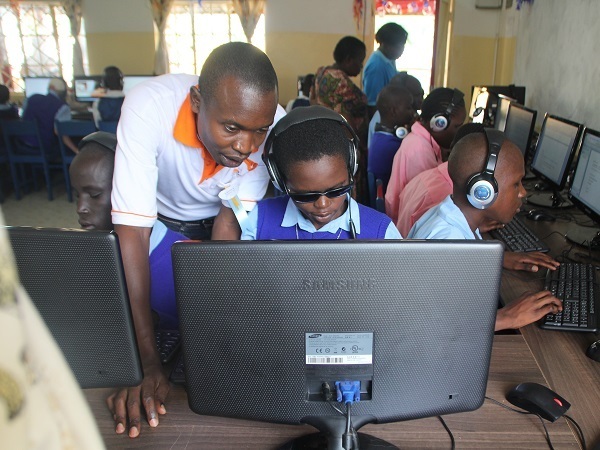分享到
Until recently, blind and visually impaired students in Kenya were still using Braille books for their studies. But Kenyan schools for the blind are now beginning to adopt technology that provides material in a audible form -- and in the process expands their opportunities.

Lucas Mwanzia, 17, intently searches the internet for information. Today's class is on biology. Mwanzia is visually impaired and for the last two years has been attending computer classes at the Thika School for the Blind.
Mwanzia is in eighth grade, having started school at a later age because of his vision.
He says the technology has opened up new frontiers that were once inaccessible.
"Braille books are quite expensive and you have to use quite a sum to purchase one," Mwanzia explained. "But now since we have computers we get the books at virtually no cost. So we download the various books to read and when are done we just close the program."
'Assistive' technology
The school embraced "assistive technology" six years ago, enabling blind and visually-impaired students to access information from computers and iPads.
Zachary Muasya, one of the school's teachers, was born blind. He has been teaching the students how to use the technology for about two years now.
He says the technology presents opportunities that can level the playing field for his students.
"Assistive technology equips the learners with very many skills that really make them independent in life," he said. "They can read materials like books, magazines, newspapers by themselves. And apart from that -- assistive technology equips them with employable skills."
The assistive technology costs $1,000 for a school to install. But an NGO called InAble has provided it to the schools at no cost.
Challenges remain
Peter Okeyo, the program manager at InAble, says blind students using the technology may still face challenges when they move to higher education.
"When learners move from primary to high school and then to universities, they go to university and then they realize there is not that technology," Okeyo said. "So the fact that they learnt that technology in primary and high school, when they move to university they go back to braille which is another challenge to them."
So far, four out of Kenya's 11 schools for the blind have adopted the technology. InAble says it will provide the funding for the remaining schools to come on board.
Vocabulary
impaired:受損的
來源:VOA
編輯:丁一
上一篇 : CES Shows Off Technology Trends for 2016
下一篇 :
分享到
關注和訂閱


電話:8610-84883645
傳真:8610-84883500
Email: languagetips@chinadaily.com.cn